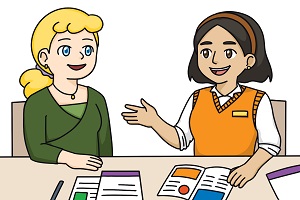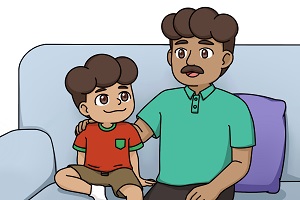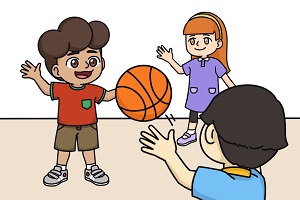Talking about ADHD with your child
Talking about ADHD with your child helps them understand what they need to support their attention, regulation and concentration skills.
You’ll have lots of conversations about ADHD with your child. The way you talk about it will depend on your child’s age and understanding.
Use words that your child understands and answer any questions as clearly and simply as you can.
In this video, families share the different ways they talk about ADHD.
These conversations help their children:
- understand their strengths
- find ways that help them learn
- build their self-confidence.
Visit these links and resources for more ideas on what you might say when your child is ready to start talking about ADHD.
How to talk to your child about their ADHD | AADPA
Recognising your child's strengths and interests | Child and Adolescent Health Service
Summary
- Talking to other people about your child’s ADHD is important. This helps you get the right support both at school and at home.
- Having these conversations can be tricky, especially if other people don’t know much about ADHD.
- Finding out more about ADHD will help you have these conversations.
- Talking about ADHD will also help you find support.

Parenting a child with ADHD comes with unique joys and challenges.
Talking to family, friends, teachers, and others about your child's ADHD can help create understanding, build support, and strengthen relationships.
Understanding ADHD and your child’s needs
- Learn about ADHD from trusted sources so you are able to share accurate information.
- It might help to describe ADHD as a difference in how the brain works rather than as a behavioural problem.
- Use simple, positive language. For example, 'ADHD means my child has lots of energy and needs to move to focus'.
- Highlight your child’s strengths alongside their challenges. For example, 'Jack’s ADHD means he thinks and learns differently. He’s really creative and has a great sense of humour, but sometimes he finds it hard to sit still and focus'.
Advocating for your child
- Advocating means to speak-up, support or take action to help your child.
- Before any meetings, write down key points you want to discuss and practice what you want to say so you feel prepared.
- Share what you have noticed works or doesn’t work and ask others to share what they have noticed. Working together with others means everyone can support your child to succeed.
- Stay calm and focus on solutions rather than things you find frustrating. For example, 'I’ve found that using a checklist helps Lily get through her weekend chores quicker and I don’t need to remind her so much. Could something like this help at school too?'
Helping others understand ADHD
- Many people don’t know much about ADHD, and ADHD is different in every child. Share what ADHD looks like for your child.
- Gently correct incorrect beliefs. For example, 'It’s not about being lazy. ADHD affects how the brain processes information'.
- Be patient, some people may take time to understand.
- Share reliable resources and websites with those who want to learn more.
Finding and building support
- It is useful to talk to people who understand and will support you and your child.
- Connect with other parents of children with ADHD for advice and encouragement.
- Advocate for your child at school by working with teachers and support staff.
- Look for professional advice when you need it. There’s no shame in asking for help.
- Remember to look after yourself. Helping your child is easier when you feel well supported.
You can find support by:
- joining a local or online ADHD parenting group
- asking your child’s school about resources or ways they can support your child
- talking to close family and friends about how they can help you and your child
- speaking with your GP or paediatrician about other people or services that can support you and your child.
Summary
- Some parents worry about their child starting medicine for ADHD.
- Your child may feel worried too.
- It’s important to remember that these medicines are safe and will usually help your child.
- Talk to your child about how medicines for ADHD might help them and make them feel.

What to say to your child
It’s important your child has some understanding of what ADHD is and how it affects the way their brain works. When you talk about your child’s ADHD, keep the conversation positive and remind them of their strengths.
Use the words that your child uses when they describe how their brain works. For example:
'You know how sometimes you tell me your brain doesn’t want to pay attention. That’s because it works a little differently to some other people’s brains. This is called ADHD'.
Use simple words to explain what the medicine does. For example, 'This medicine will help all the parts of your brain work together. It will help you concentrate and learn new things'.
Encourage your child to talk about how the medicine makes them feel. Explain that it’s normal to feel a little bit different when they first start taking the medicine.
You can also tell them that the medicine won’t work right away and that it might take a few weeks to see if it helps.
Taking medicine for ADHD
Medicine for ADHD works best when it is taken at the same time each day. Your child’s doctor will tell you when they need to have their medicine.
Use a daily reminder to help you remember to give your child their medicine. For older children, give them some responsibility for remembering to take their medicine.
When your child starts a new medicine, you may like to keep a medicine diary in the first few weeks. Write down any effects of the medicine (both good and bad). Don’t forget to ask your child how they feel.
Let your child’s teacher know when they start taking medicine. The teacher can then notice how your child is responding at school and if there are any side effects.
Sometimes children may refuse to take medicine. You can help your child by:
- being positive yourself
- allowing your child to take the medicine themselves with your supervision
- giving your child time to take the medicine
- never forcing your child to take the medicine.
Talking with your child’s doctor
Your child’s doctor will involve both you and your child in the discussion about starting medicine for ADHD. Your child will need to visit their doctor regularly to check how the medicine is helping them.
Encourage your child to talk to the doctor about the medicine and to ask any questions they have.
If your child is worried about swallowing tablets, talk to their doctor about how you can make this easier for them.
Always talk to your child’s doctor about any side effects you or your child have noticed.
Remember to always store medicines safely so young children can’t reach them.
Please watch the two videos below to learn more about medication for ADHD and family conversations about ADHD.
Resources
Complex ADHD Service booklet – Chapter 7 │ Child and Adolescent Health Service
How to talk to your child about their ADHD │ Australasian ADHD Professionals Association

A warm and responsive relationship with your child is the foundation on which they will develop future relationships with others.
Your child’s communication and social skills will develop throughout primary and high school. Their needs, worries and friendships will also change over this time.
Explore the links below for ways you can connect and communicate with your child as they grow.
School-age connecting and communicating | Raising Children Network
Pre-teens communicating and relationships | Raising Children Network

